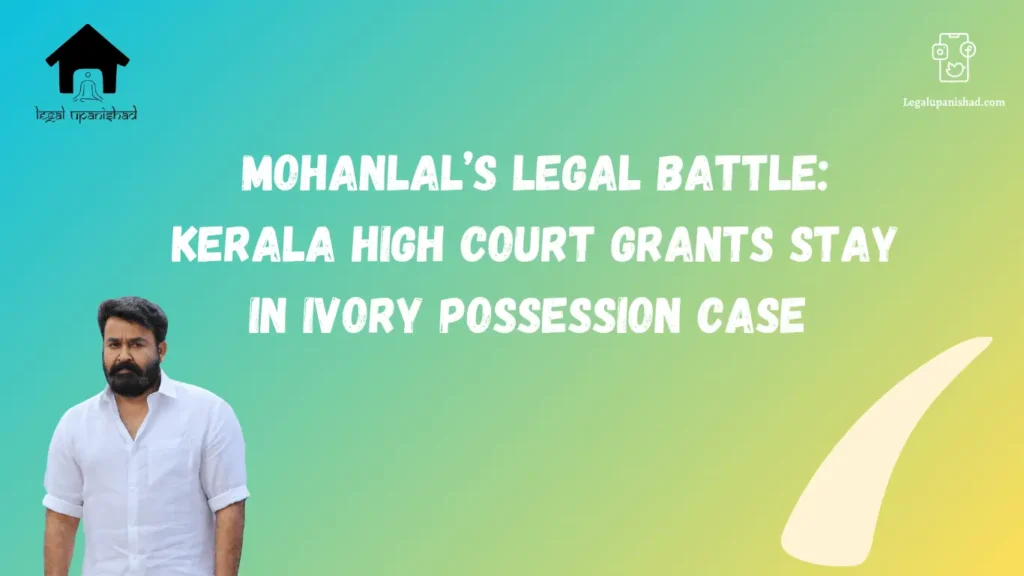This article on ‘Mohanlal’s Legal Battle: Kerala High Court Grants Stay on Ivory Possession Case.’ was written by Mariya Khan, an intern at Legal Upanishad.
INTRODUCTION
India is a land where people are worshippers of nature and animals and many of the gods and goddesses in Hindu mythology take incarnation in the persona of animals to show the value and importance of the animals and nature legislator of our country also preserves this value system in our environmental statute such Environment Protection Act, 1986, Forest Conservation Act, 1980, Wildlife protection act 1972 and many others and make them stricter for the violators of such laws.
The Indian judiciary from time to time takes cognizance of protecting nature and ecology. For the same purpose the National Green Tribunal was set up in the year 2010 as ordained in the National Tribunal Act, one can say that it is the unique judicial body equipped with expertise solely to adjudicate environmental cases in the country.
Recently, the Kerala High Court granted a stay order in the ivory possession case in which the Megastar Malayalam Actor Mohanlal is accused. What is the case, how Mohanlal was involved, and why did the court grant a stay order in the case? We will be discussing this in the article.
ASIAN AND AFRICAN ELEPHANTS
Asian and African elephants are in danger, they are at the point of extinction, in such scenarios, the protection of elephants plays a crucial role in ecological balance. Elephant poaching is prohibited in India, poachers acted heinously only for the ivory of the mammoths to satisfy the demand for such antiques in the international market. In the year 2017, a survey was conducted by the Wildlife Protection Society and concluded that illegal hunting/poaching and trading of Asian Elephants have increased.
LAWS RELATED TO ANIMALS IN INDIA
Wildlife Protection Act, 1972
Some of the features of this Act, are as follows;
- It prohibits the illegal hunting and poaching of wild animals with slight exceptions. List down all the endangered species in the schedule of the act.
- It acknowledges that wild Animals aren’t for commercial transactions.
- It claimed to protect the animals from all sorts of human intervention and disturbance.
- It also prohibits capturing and killing animals in sanctuaries.
- It provides a licence for hunting and possession of wildlife antiques.
- Possession of ivory is justified only on the representation of the certificate/ licence which has been issued with the bonafide intention.
Environment Protection Act 1986
Some of the features of this act are as follows:
- It prohibits ivory trading under section 49B of the Environment Protection Amendment Act, 1991.
- Punishes and imposes penalties for the Violator of the laws and regulations.
- Promote sustainable development of the environment.
FACTS OF THE CASE
The story begins in the year 2011 when the Income Tax Department conducted a raid at the house of Mohanlal at Thevara Kochi and found 4 ivory tusks and 13 artifacts in his possession with no legal certificate or licences. The First Information Report (FIR) was lodged against him under the Wildlife Protection Act, of 1972. Although such an FIR was registered six months after the raid.


Fast forward to 2019, the investigation took the whole eight years, at last in 2019 the officers of the forest department submitted the charge sheet in the court, and then a trial was initiated in front of Anju Cletus Judicial Magistrate First Class (JMFC) Court 3, Perumbavoor Ernakulam district Kerala.
ARGUMENTS BY BOTH PARTIES
Mohanlal’s Counsel: Argument by A.A Poulose and James Mathew
- Such ivory tusks are of the captive elephant (already dead) on such a basis Mohanlal hasn’t violated any law under the Wildlife Protection Act.
- No prosecution would lie against him and to support their argument they present the certificate issued by the competent authority to possess such artifacts. A certificate of ownership was issued by the Principal Chief Conservator of Forests (Wildlife) and Chief Wildlife Warden.
- Those artifacts are received as a gift to Mr. Mohanlal so, no questions of ownership should aroused against him.
Petitioner contention: Argument by Assistant Public Prosecutor (APP)
- Those certificates which validate the possession of ivory tusks were issued and present during the ongoing investigation in 2015, which makes the possession illegal and shall be called void ab initio. No appeal can be allowed to withdraw the allegation against him.
- Assistant Public Prosecutor APP and complaint allegedly said the actor has tried and toiled to bury the case at the initial stages of the investigation and successfully protect himself from prosecution in those eight years.
- The purpose of the enactment of the Wild Protection Act was merely to preserve the ecology of the country for the greater good of human life and the life cycle, not to protect the rights of the individual.
INTERVENTION OF STATE GOVT
After a wrangle back and forth over the years, the state government issued a No-Objection certificate that avowed the possession of such ivory tusks and clarified that certificates of occupancy are retrospective effect and are as per law. In other words, the retrospective nature of the certificate makes the possession valid for the earlier years when such artifacts were received or made valid from initio. And stated that there is no public interest in this case. However,r in June 2022 court rejected the no-objection certificate and said: “No party including the State can claim the benefit of the laches from their side”.
HIGH COURT INTERVENTION
After getting rejected, the Counsel of the accused ( Actor Mohanlal ) and the Kerala state government moved to the high court against the order of the lower/ magistrate court. On February 22, 2023, the High Court instructed the magistrate court to reconsider the plea of the accused party.
Upon the instruction of the high court, the judicial magistrate reconsidered to withdraw the case; however again in August 2023, the JMFC court rejected the plea after remarking that even a fresh plea was filed without the disclosure of the validity of the certificate of possession. And directing all the accused in the case to remain present before the magistrate court in another hearing on the 3rd of November 2023. Subsequently, PV Kunhikrishnan, justice of Kerala High Court stayed the proceedings for six months.
OPINION
In my humble opinion I would like to say concerning this matter why the government is so partial in a matter where the question is about conservation and endangered species which makes it more vulnerable just because high profile celebs are involved here. Suppose any common man has done this what would happen to that individual we all can predict the same. Being the signatory of environmental protection international conventions, the stand of the government is not justifiable.
A stay order by the High Court is unacceptable, rather it must be put on speedy trial to resolve the matter as fast as possible, by putting such a spread breaker it is completely a waste of time of the court.
SUGGESTIONS
The suggestion that any prudent man can give is that the judiciary needs to take the upper hand in deciding such crucial matters without being pressured by a third party. Second this case should be put on speedy trial to resolve this matter and case with a similar nature especially where environmental issues are involved.
CONCLUSION
In a nutshell, the case is still pending, proceedings started in 2011, and judicial proceedings commenced in 2019, after years of wrangling the situation and the case of the matter is still the same, the court is neither convinced from the proof of the alleged party nor take any cognizance against them. The repeated intervention of the state government shows the biased intentions of the government towards the alleged party and ignorance toward the duty of the government, which directly defeats the purpose of the environmental statute.
LIST OF REFERENCES
- Wildlife Protection act 1972
- Environment Protection Act, 1986
- Sara Susan Jiji ‘ Kerala High Court stays proceedings against actor Mohanlal in ivory possession case’ Bar & Bench, 19 September 2023, available at: https://www.barandbench.com/news/kerala-high-court-stays-proceedings-against-actor-mohanlal-ivory-possession-case (last visited 23 September 2023).
- ‘Ivory ownership certificates issued to Mohanlal illegal, argue petitioners’ The Hindu, 24 May 2023, available at: https://www.thehindu.com/news/national/kerala/ivory-ownership-certificates-issued-to-mohanlal-illegal-argue-petitioners/article65457779.ece (last visited 23 September 2023)

